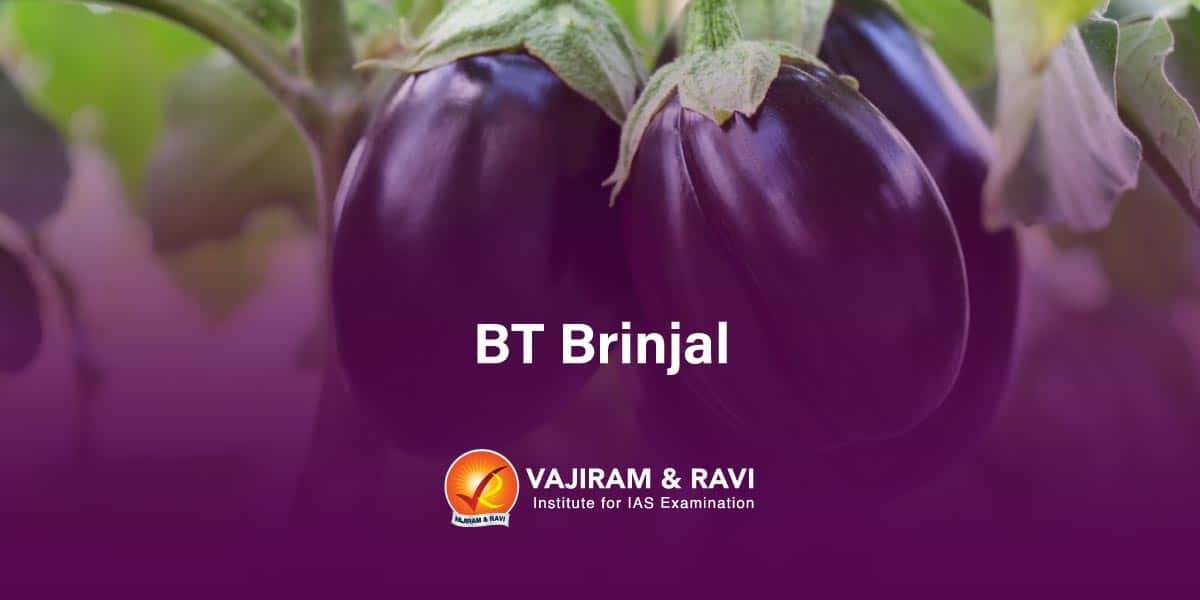The brinjal is highly susceptible to pest attacks, of which the fruit and shoot borers cause the most damage in terms of yield. Primarily, it is to address this pest that the genetically modified (GM)Bt brinjal has been developed by Mahyco Monsanto Biotech. It is a joint venture between Maharashtra Hybrid Seed Company and the US seed giant Monsanto.
This brinjal contains the Bacillus thuringiensis (Bt) gene, which is said to provide resistance to lepidopteran insects such as the brinjal fruit and shoot borer (FSB) Leucinodes orbonalis and the fruit borer Helicoverpa armigera. Bt Brinjal has not been approved for commercial cultivation in India.
Development of Bt Brinjal
Bt Brinjal is a transgenic brinjal created by inserting a Bt gene (cry1Ac) from the soil bacterium Bacillus thuringiensis into Brinjal by the Agrobacterium-mediated recombinant DNA technology.
- The transgenic plants expressing the cry1Ac gene exhibit resistance to the brinjal fruit and shoot borer (FSB).
- When ingested by the FSB larvae, the Bt protein is activated in the insect’s alkaline gut and binds to the gut wall, which breaks down, allowing the Bt spores to invade the insect’s body cavity. resulting in the insect’s death within 48–72 hours.
- A significant reduction in shoot and fruit damage was observed compared to the non-Bt brinjal hybrids or varieties.
- Furthermore, pesticide spraying has been reduced significantly in Bt brinjal.
India and Bt Brinjal
Brinjal holds significant importance as a vegetable crop in India, serving as a rich source of vitamins and minerals, notably iron. Approximately 550,000 hectares of brinjal are grown in India, making the country the second-largest producer after China. It is a significant cash crop for over 1.4 million small, marginal, and resource-limited farmers.
- Brinjal is a hardy crop that produces well even in drought conditions and is grown in almost every part of the country.
- Major brinjal-producing states: West Bengal, Orissa, Gujarat, and Bihar.
- In India, Bt brinjal is the first food crop being evaluated for commercial release. Since its inception in 2000, the crop has been subjected to rigorous scientific testing to determine its food safety, environmental safety, human and animal health safety, and biodiversity.
- Role of Genetic Engineering Appraisal Committee (GEAC): Genetic Engineering Appraisal Committee (GEAC)under the Ministry of Environment and Forests (MoEF)has recommended the environmental release of Bt Brinjal based on the recommendations of the Review Committee on Genetic Manipulationand two expert committees constituted by the GEAC between 2006 and 2009.
- The central government imposed an indefinite moratorium on Bt brinjal in 2011 and recommended 10 years of field trials. Bt Brinjal will benefit small farmers because it is insect resistant, increases yields, is more cost-effective, and has a low environmental impact.
- Concerns about Bt Brinjal, on the other hand, revolve around its potential negative impact on human health and bio-safety, livelihoods, and biodiversity.
- In 2020, the GEAC and Govt. of India again allowed biosafety research field trials of two new transgenic varieties of Bt Brinjal in eight states during 2020-23 after taking no-objection certificates from states.
- These indigenous transgenic varieties of brinjal hybrids, namely Janak and BSS-793, containing the Bt Cry1Fa1 gene have been developed by the National Institute for Plant Biotechnology.
Advantages of Bt Brinjal
- Improvement in Yield: Adoption of Bt Brinjal hybrids would provide a yield gain of 37 per cent and a reduction in total insecticide use of about 42 per cent over non-Bt hybrids.
- Bt brinjal was found to be effective against fruit and shoot borer (FSB), with 98% insect mortality in Bt brinjal shoots and 100% in fruits compared to less than 30% mortality in non-Bt counterparts.
- Decrease in pesticides: Being pest resistant, Bt Brinjal can reduce the dependency of farmers on pesticides. It can also result in a substantial decline in pesticide residues in brinjal, which is beneficial to the health of consumers, including the farmers themselves.
- Income Benefit: Scientists have estimated that Bt Brinjal will deliver farmers a net economic benefit with national benefits to India exceeding $400 million per year.
- Safety of beneficial insects: Bt brinjal does not affect beneficial insects such as aphids, leafhoppers, spiders, and lady beetles.
- Biodiversity: Bt brinjal does not exhibit any different agronomic or morphological traits compared to non-Bt brinjal which may give it a competitive advantage over other species in the ecosystem.
Concerns related to Bt Brinjal
- Risk to human health: The consumption ofBt Brinjal is harmful to human health because it contains antibiotic markers.
- It produces a protein in vegetable cells that causes antibiotic resistance, leading to the ineffectiveness of medicines.
- Toxicity studies done by Mahyco show that consuming genetically modified brinjal on a regular basis can cause immunological, liver, and reproductive issues.
- Issues of Safety Test: The plant family Solanaceaeto, to which brinjal belongs, is problematic because it contains several natural toxins that can resurface when metabolism is disturbed. It is criticized that the testing is not specific or stringent enough to detect toxins.
- Loss of biodiversity: There are about 2000 varieties grown across India. Transgene transfer to local and hybrid brinjal varieties will effectively eliminate brinjal diversity.
- Economic Impact: While doing agronomic studies, Bt brinjal has not been compared with best agricultural practices like non-pesticide management.
- The majority of the farmers in India are small and marginal farmers, so the possibility of maintaining isolation distances is nonexistent.
Last updated on April, 2025
→ UPSC Notification 2025 was released on 22nd January 2025.
→ UPSC Calendar 2026 is released on 15th May, 2025.
→ The UPSC Vacancy 2025 were released 1129, out of which 979 were for UPSC CSE and remaining 150 are for UPSC IFoS.
→ UPSC Admit Card 2025 is released now for CSE Prelims Exam 2025.
→ The UPSC Prelims 2025 is scheduled to be conducted on 25th May 2025 and UPSC Mains 2025 will be conducted on 22nd August 2025.
→ Apply once through it and aspirants can apply for various government exams conducted by UPSC.
→ The UPSC Selection Process is of 3 stages-Prelims, Mains and Interview.
→ UPSC Result 2024 is released with latest UPSC Marksheet 2024. Check Now!
→ UPSC Toppers List 2024 is released now. Shakti Dubey is UPSC AIR 1 2024 Topper.
→ Also check Best IAS Coaching in Delhi
Bt Brinjal FAQs
Q1. What is Bt Brinjal?+
Q2. Why was Bt brinjal banned in India?+
Q3. Who introduced Bt brinjal?+
Q4. Which country approved Bt brinjal?+
Tags: bt brinjal quest


















